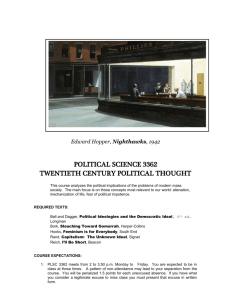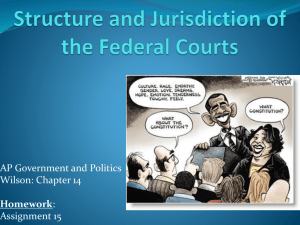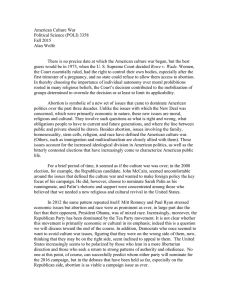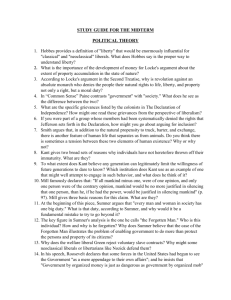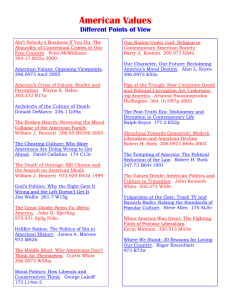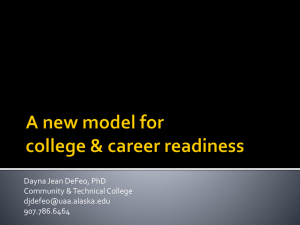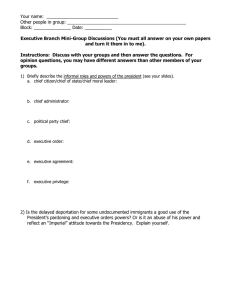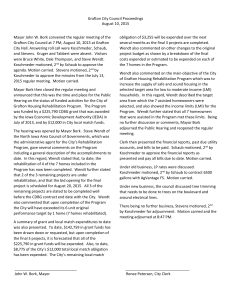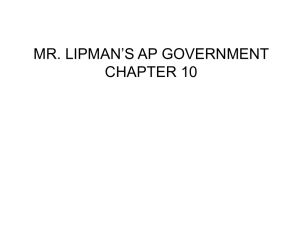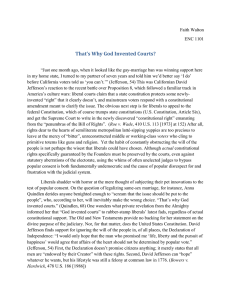Conservative Polemics Concerning the Supreme ... Nomination of Robert H. Bork
advertisement
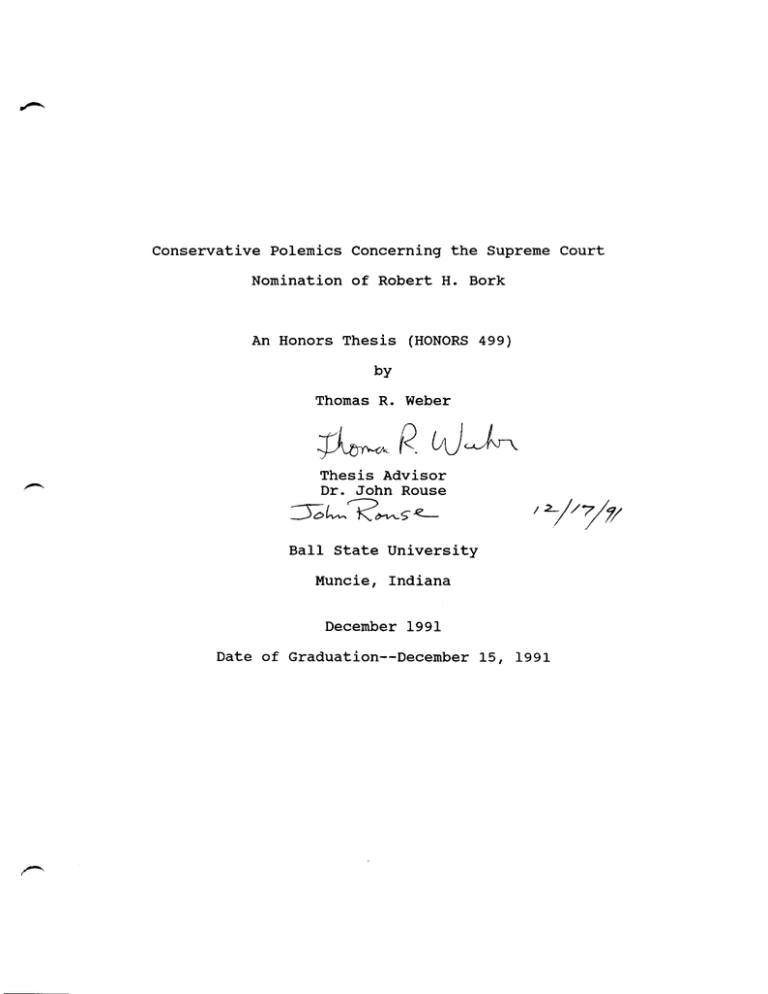
Conservative Polemics Concerning the Supreme Court
Nomination of Robert H. Bork
An Honors Thesis (HONORS 499)
by
Thomas R. Weber
Thesis Advisor
Dr. John Rouse
::I;LKMA-S'~
Ball State University
Muncie, Indiana
December 1991
Date of Graduation--December 15, 1991
i <.{
I "i'~ f
Purpose of Thesis
Robert H. Bork's nomination to the united states Supreme Court
was rejected by the Senate on October 23, 1987.
This paper seeks
to identify the tactics and motivations of the people responsible
for his defeat.
and
the
Those involved include members of interest groups
academic
community,
southern
Democrats
and
moderate
Republicans in the Senate, members of the White House staff and the
President of the united states.
Since the dynamics of the two prevailing judicial philosophies
would take up considerable space to explain, for the purposes of
this
paper,
sufficient.
be
a
brief
description
of
each
theory
should
be
within the context of this paper, a conservative will
regarded
as
someone
constructionist)
who
judicial
has
an
interpretivist
philosophy.
In
other
(or
strict
words,
a
conservative is someone who tries to understand the priniciples
that the framers of the Constitution were trying to protect, and
applies that principle to today's circumstances.
Conversely,
a
liberal will be defined as someone who has a "noninterpretivist"
(or activist)
judicial
philosophy.
A liberal
is
someone who
believes judges are not bound by the intent of the framers,
should seek to create new rights based on their own moral
but
or
philosophical views.
Conservatives and liberals have fundamental disagreements over
issues such as abortion, affirmative action, defandant's rights,
the death penalty and the right to privacy.
These disagreements
were the basis of the dispute over the confirmation of Robert Bork.
The unit.ed states Supreme Court has undergone an ideological
reversal during the past decade.
George
Bush have
judges
such
as
replaced
Antonin
Presidents Ronald Reagan and
retiring
Scalia,
liberals
Anthony
O'Connor, David Souter and Clarence Thomas.
with
Kennedy,
conservative
Sandra
Day
Meanwhile, liberals,
fearing the conservative-dominated court will overturn landmark
decisions such as Roe v. Wade, have been searching for a way to
have input on the selection process.
The proponents of judicial
activism have subsequently targeted the confirmation process as the
only means by which they can affect the make-up of the Supreme
Court, as long as there is a conservative President in the White
House.
Robert H.
Bork was nominated by Ronald Reagan in 1987 to
succeed the retiring Lewis Powell.
scholarly,
judicial
conservative
restraint.
Bork had a reputation as a
jurist who was
Bork
believed
a
strong
"judges
must
proponent
of
be
by
bound
principle and not permitted to make distinctions that depend on
value judgments."
(1)
Bork articulated his conservative views in
extensive writings, often criticizing the basis of decisions made
by activist courts during the 1970s.
His candor made him an easy
target for criticism and helped his opponents in the Senate
and elsewhere to mobilize an unprecedented campaign to defeat his
nomination.
Two days after Powell announced his retirement in June of
1987, the president of the National Organization for Women, Eleanor
Smeal, announced that interest groups would engage in a fight to
2
defeat the nomination of Robert Bork:
Women's groups and civil rights groups have pledged to
fight a Right wing ideological take-over of the Supreme
Court with the nomination of u.s. Appeals Court Judge
Robert Bork, or for that matter, any nominee who will
shift the majority of the Court to oppose legalized
abortion and birth control, to abolish the right to
privacy, to destroy affirmative action, or to roll back
30 years of civil rights and women's rights progress.
Group leaders ... made it clear they would fight one-twoor-more nominees who would give reactionaries the coveted
fifth vote on the Court. Women's groups see a possible
Bork appointment enabling the Right Wing to amend the
constitution with just one vote. ~
Smeal's announcement was only the beginning.
Dozens of groups
eventually went on record publicly opposing Bork.
The National Women's Law Center released a study of Bork's
-
record as a scholar and judge on August 18,
saying they would
oppose his nomination because his record was "unparalleled in its
hostili ty to women's
rights
and would
leave women defenseless
against governmental sex discrimination."
(3)
National Abortion
Rights Action League spokesman Richard Mintz announced that his
group planned to urge each member to find five friends to pressure
senators for a "no" vote on Bork.
"They organized public rallies
against the nominee; speaking to college students, women's groups
and public health groups.
They also went to the streets and
shopping malls handing out anti-Bork material."
(4)
In a joint news conference held by the National Federation of
Business and Professional Women's Clubs, the American Association
of University Women,
Women
of
Color,
NARAL,
it was
NOW and the National Institute for
announced
the groups would
coordinate
efforts to actively oppose Bork because "his recorded view is so
3
outrageous from our point of view, we decided we couldn't sit this
one out."
They added that Bork would be "bad for the economy."
(5)
After announcing opposition to the nominee and pledging to
lobby Senators to oppose Bork, a number of interest groups decided
to proceed one step further.
They began an unprecedented fund-
raising drive to buy negative advertising against Bork.
Although
private organizations are not required by law to disclose the
information, political analyst Suzanne Garment estimates the groups
raised between $18 and $20 million for advertising purposes.
The day before the hearings began,
(6)
negative advertising by
liberal special interests turned up on the pages of newspapers
-
across the country.
Anti-Bork stories originating from interest
groups' press releases were combined with a series of full-page
advertisements to shape the public's image of Bork.
For example,
NARAL advised, "You wouldn't vote for a politician who threatened
to wipe out every advance women have made in the 20th century.
Yet
your Senators are poised to cast a vote that could do just that."
Planned Parenthood predicted, "If your senators vote to confirm the
Administration's latest Supreme Court nominee,
you'll need more
than
It
a
prescription
to
get
constitutional amendment."
(7)
birth
control.
might
take
a
People for the American Way warned,
"Robert Bork has a lot of people worried.
with good reason.
Bork
believes in sterilizing workers, billing consumers for power they
never got,
right. "(8)
no privacy,
At
best,
no day in court, big business is always
the
outrageous
accusations were
a
gross
oversimplification of rulings Bork had made at various stages of
4
his career.
At worst, they were a calculated effort to mobilize
and energize a movement to defeat the nomination of Bork.
As
the
hearings
personal life.
began,
rumors
were
spread
about
Bork's
The contents of a confidential FBI report on the
nominee were leaked to the media and were the origin of the rumor
suggesting Bork had a problem with alcohol.
-
Using anonymous sources, an increasing scourge of
contemporary journalism, a newspaper reported during the
start of the hearings that an FBI investigation of the
nominee had revealed he was taken to the emergency room
of Sibley Memorial Hospital in Washington, D.C. on two
occasions in December of 1983 to treat a broken arm and
sprained wrist he had suffered by falling on icy
walkways.
The report said that although Bork did not
drive himself to the hospital, the alcohol found in his
blood during the second visit had been one point less
than the level considered safe to drive. (9)
Several days later, another story about Bork's personal life
appeared in print.
Time magazine's David Beckwith reported that
Bork was an agnostic.
Bork,
who was relying on support from
religious fundamentalists, denied the accusations and stated,
I don't want to go into my religious beliefs, but the
report in a national magazine that I was agnostic arose
from the following conversation, and the reporter agrees
that it rose from the following conversation. He said,
'You're not terribly religious, are you?'
And I said,
'Not in the sense you mean.'
That's it.
He went
bang, 'He's an agnostic.' And I later denied that I was
an agnostic, in the New York Times, when I got a chance
to.
I took him to be talking about regular--you know,
great piety and regular church attendance, and that's
what I mean ... But agnostic does not corne out of that
conversation in any way, and I am not an agnostic. (10)
It was impractical for Bork to respond to each of the charges
levied against him by his opponents.
~
But his son, who worked in
the Washington press corps as the assistant editor of U.S. News and
5
World
Report,
wrote
a
letter
to
the
Washington
Post
when
a
particularly inflammatory rumor circulated that Bork's wife, Mary
Ellen, was anti-semitic.
Robert Bork Jr. wrote,
Three months ago the President honored my father by
nominating him to become an associate justice on the U. S.
Supreme Court.
Since then our family has endured a
relentless and bitter campaign against my father. Week
by week the campaign has mounted. As the distortions were
repeated over and over again, we watched my father
portrayed as some villainous ideologue, a racist and a
sexist. For his opponents, the more he is made to look
like a crazed neanderthal, the better for them. Indeed,
one particularly ugly rumor spread by his opponents to
injure him is that my stepmother, Mary Ellen, doesn't
believe
that
the
Holocaust
happened.
These
characterizations, these rumors, are vicious slander and
they hurt.
They hurt because the people I meet on the
street who took the trouble to watch and listen to his
testimony before the Senate Judiciary Committee know that
they are untrue. My stepmother, brother, sister and I-who know him better than anyone--know they are untrue.
And what's more, the special interest groups who have so
masterfully spread these lies know it too. (11)
Never before had there been a national media campaign against
a
Supreme
Court
constituency
nominee.
interest
Nor
groups
opposition to a candidate.
was
were
there
more
ever
solidly
a
time
when
organized
in
Their ultimate goal was to pressure
Senators to vote against the nomination.
Judge Bork was not without his supporters.
But pro-Bork
lobbyists admitted they were underfinanced and poorly organized.
Patrick McGuigan, who was trying to mobilize grass-roots support
for Bork, once pleaded with a Reagan Administration official for
financial support from the White House.
-
'For God's sake, the other side has Abe Lincoln himself
[Gregory Peck in the advertisements distorting Bork' s
judicial record] in their TV spots. You need to get the
President on the horn to some of his rich buddies and the
word needs to get out that this needs to happen.'
'We
6
can't do that.
It's just not appropriate for the
President to raise money for a lobbying operation,' he
replied. I bluntly answered, 'I don't care how you do it.
I don't care if it's done with winks and nudges.
I'm
giving you my honest assessment.
As your hard-working
outside ally who is delivering the grass-roots part of
this effort, I believe that Bob Bork will lose unless,
in addition to our stuff, there is a sophisticated,
targeted
media
budget
to
offset
the
negative
advertisements. We don't have to match the other side,
but we do have to be visible and effective in paid
media.' (12)
Even if Bork's supporters had the money they needed to buy
counter-advertising, they did not have the public relations knowhow to use it as effectively as the opposition.
McGuigan even
confessed their shortcomings during the first week of hearings.
One thing I realized as the week went on is that the
other side blanketed the media in the hearing room
regularly with analysis and 'spin' documents, serving
their need for context for the sometimes convoluted
discussions in the hearing room.
It was dawning on us
that we had missed the boat in that respect. (13)
It is ironic that Reagan, who mastered the art of spin-doctoring
during his Presidential campaigns,
because
of
"unwillingness
defense of the nomination."
or
lost a Supreme Court nominee
inability
to
mount
an
effective
(14)
The Reagan Administration eventually responded to some of the
attacks against Bork.
On September 10, Interior Secretary Donald
P. Hodel told reporters,
Judge Bork's critics have totally politicized the
process, hoping to turn votes against him without regard
to the merit of his credentials or his abilities. It's
not enough now just to defend Judge Bork. We've got an
obligation to put out the word about how the Left has
transformed the debate into character attacks and is
using it to raise money for its causes. ~~
The Justice Department issued a 213-page report stating the attacks
7
on
Bork
were,
"illegitimate
and
Their
unwarranted.
shoddy
methodology and analysis seek to characterize a distinguished and
fair-minded jurist as biased and closed minded."
(16)
Furthermore,
the widely publicized criticisms of Bork:
Should be dismissed for the propaganda that they are and
should not confuse the debate over Judge Bork's
confirmation ... These reports criticize him as being
motivated by his own political agenda.
Yet Judge Bork
neutrally applies the law.
In contrast, the special
interests evaluate judges precisely the way that they
rank politicians--according to the number of times they
deliver results desired by a particular special interest
to further a political goal. 0n
Senators, of course, could not dismiss the views of constituency
interest
-
groups
because
they
are
an
important
part
of
a
politician's constituency.
The Chairman of the Senate Judiciary Committee, Sen. Joseph
Biden (D-Delaware), was one of the first Senators to go on record
against Bork.
Biden, who stated in 1986 that if Bork's background
check was clean, "I'd have to vote for him,"
0~
changed his mind
one year later in the midst of his campaign for the Democratic
nomination for President.
began,
Biden
announced
In fact,
he
would
months before the hearings
oppose
Bork's
nomination.
Furthermore, he was instrumental in delaying the hearings so that
interest groups would have more time to organize opposition.
Biden was roundly criticized by conservatives for delaying the
hearings until after the recess.
Republican National Committee
Chairman Frank Fahrenkopf said Biden's actions were a direct
-
response to the will of interest groups.
I think the nomination of Robert Bork blew the lid off
the special interest pot on the Democratic Party burner.
8
We now see the real Democratic Party coming out. We see
the radical feminist groups, we see the radical gay
rights groups, we see the radical opponents of the rightto-life, we see all the organized labor groups, coming
out and condemning Judge Bork before a hearing was ever
held.
The minute those special interests started to
howl, Biden automatically took the position that he was
going to vehemently oppose Judge Bork.
Here is the
individual charged under the constitution of the united
states with being the one to run the advice-and-consent
hearing coming out, before a word is spoken, and
condemning the nominee. That's a direct reaction to the
special interests and their control over the Democratic
nominating process. 0~
Biden
spoke
first
when
finally began in September.
the
Judiciary
committee
hearings
Claiming to be "deeply troubled" with
Bork's writings, Biden predicted Bork would prevent Americans from
using birth control, force state population mandates and deny them
their right to look at pornography.
"We must pass judgment of
whether your philosophy is an appropriate one in this century."
(20)
Before Bork was given a chance to speak in the hearings, another
outspoken
Bork
critic,
Sen.
Edward
Kennedy
(D-Massachusetts),
proclaimed, "In Robert Bork's America there is no room at the inn
for blacks, and no place in the Constitution for women; and, in our
America, there should be no seat on the Supreme Court for Robert
Bork."
(21)
The Senators took turns speaking for several hours before
finally beginning to question Bork.
recalling
the
ad
claiming
women
Sen. Orrin Hatch (R-Utah),
would
need
a
Constitutional
amendment to get birth control if Bork were approved,
-
tried to
clear up this obvious misrepresentation of Bork's record by asking
the
judge
if
he
had
anything
against
birth
control.
Bork
9
responded,
"Nothing whatsoever!
I think the Connecticut law was
an outrage, and it would have been more of an outrage if they had
ever enforced it against an individual."
(22)
Later, Hatch bluntly
questioned Bork about abortion.
HATCH: You've been criticized for having been critical
of this abortion case called Roe v. Wade.
Can you
explain your apprehensions about this case?
BORK:
Roe against Wade contains almost no legal
reasoning. We are not told why it is a private act ... and
if it is, there are lots of private acts that are not
protected. Why this one is protected, we're simply not
told that.
HATCH: Is it safe to say you haven't made up your mind
on (how he would vote to strike down Roe v. Wade)?
BORK: That's true.
-
(23)
Next, it was back to Kennedy who read from a prepared script as he
IIquestioned" the nominee.
KENNEDY: Above all, a Supreme Court justice must be fair
but, in a lifetime of [public] writings, Mr. Bork has
shown his bias against women and minorities and in favor
of big business and presidential power. And it's small
comfort to minorities to know that, some years after the
civil Rights Act was passed over his opposition, Mr. Bork
changed his mind and said that it had worked all
right ... [He] asks us to judge him on his record as a
judge, but, in his own speeches as a judge, he has shown
little respect for the past decisions of the Supreme
Court.
Again and again, on the public record, he has
suggested that he is prepared to roll back the clock.
.-
BORK: If those charges were not so serious, the
discrepancy between the evidence and what you say would
be highly amusing.
I have not asked that either the
Congress or the courts be neutral in the face of racial
discrimination.
I have upheld the laws that outlaw
[it] ... I
have
never written
a
word
hostile
to
women ... hostile to privacy ... I have never written a word
or made a decision from which you can infer that I am
pro-big business at the expense of other people ... Nothing
in my record suggests I have a political or ideological
agenda. (24)
10
Rather than directly question the nominee,
Kennedy,
a long-time
ally of civil rights and women's groups, used his allotted time to
read his own simplified version of Bork's judicial philosophy into
the record.
On the second day of the hearings,
a Washington Post poll
showed for the first time that slightly more people opposed the
Bork nomination than favored it.
However,
80 percent of blacks
opposed the nomination, which was extremely significant because
"racial harmony is an essential condition for Democrats to remain
competitive in the South."
(Alabama),
Wyche
Fowler
(25)
Jr.
Southern Democrats Richard Shelby
(Georgia),
Terry
Sanford
(North
Carolina), and John Breaux (Louisiana) each relied heavily on the
black vote to get elected, and risked losing re-election if they
alienated black voters.
The third day of testimony featured Sen. Patrick Leahy's (DVermont)
probe
of
Bork' s
financial
history.
He
reminded
the
nominee, "In 1979 ... you made approximately $197,000 that year for
consul ting work.
consulting work.
In 1980 ... around $250 to $300,000 a year for
In 1981 ... around $150,000.
Are those figures at
least in the ballpark?"
Bork answered quietly,
only years I made money.
There was a reason I made money, but I
don't want to go into it here."
"Those were the
After reading the figures, Leahy
asked Bork if he had ever provided the poor with free legal aid.
Moments later, Sen. Gordon Humphrey (R-New Hampshire) interrupted
Leahy's questioning, and asked Bork if his extra income, "coincided
with heavy medical bills in your family?"
Bork covered his eyes
11
with his hand and whispered "yeah."
During that time, Bork's first
wife, Claire, had been battling cancer.
night
one
sequence
of
of
the
Bork
television
and
Leahy,
Humphrey and concluding:
key
concern
of
network
closing
reporters
with
That
broadcast
Bork's
response
the
to
"The Democrats are not expected to pursue
this line of questioning."
The
She died in 1980.
(26)
the
Democrats
on
the
committee
(and
moderate Republican Arlen Specter) was whether or not Bork would
seek to bring about social change.
It was clear Bork opposed Roe
v. Wade, but no one knew for certain whether he would overrule the
decision.
--
Sen. Charles Grassley (R-Iowa) questioned him concerning
social change:
GRASSLEY: Don't legislatures do dumb things sometimes
that only the courts can protect society--only the courts
are in a position to protect society?
BORK: I'm bound to say Senator, yes they do dumb things
sometimes
and
often
those
dumb
things
are
unconstitutional. It's not a reason for making up a new
Consti tution. No, there is no clause in the Constitution
that says, the legislature shall make no dumb law.
GRASSLEY: I want to give you a question that was put to
Justice Fortas during his confirmation hearings to be
Chief Justice in 1968 ... I quote: "To what extent and
under what circumstances do you believe the Supreme Court
should attempt to bring about social, economic or
political change?"
BORK: If the social change is mandated by principle in
the Constitution or in a statute, then the court should
go ahead and bring about social change.
Brown against
Board of Education brought about enormous social change,
and quite properly. If the social change is the judge's
idea of what would be a nice social change, then Justice
Fortas 's answer is correct, 'zero.' (27)
__
This response came as a mild surprise to some conservatives who had
12
hoped Bork would be a champion for their causes.
Bork was attempting to assure the Senators he would not allow
his personal views to influence his decisions.
Bork further
explained this philosophy on September 6, when he said, "Anybody
who
thinks
I
am
going
to
be
an
activist
is
in
for
some
surprises ... One group [of backers] is painting me as a judge who
tries to interpret the law, and the other group is painting me as
a
judge
who
will
do
conservative
things
for
them.
I
would
disapprove of conservative activism as much as I would of liberal
activism.
II
(28)
Bork's
words
did
not
silence
his
critics
who
remained convinced their causes would eventually be in jeopardy if
-
Bork sat on the court.
From time to time the committee hearings contained political
bickering between Republicans and Democrats, but nothing as terse
or emotional as what happened on the eighth day of the hearings.
Chairman Biden,
who had just been forced to withdraw from the
Presidential race because the media caught him plagiarizing Hubert
Humphrey, John F. Kennedy and Robert F. Kennedy in his campaign
speeches, argued vehemently with Senator Hatch.
Biden stated the
committee would only vote on the strength of the testimony.
Then
he handed out the schedule of witnesses which, with few exceptions,
scheduled pro-Bork witnesses late in the day, much too late for
coverage on the evening news.
This move angered Hatch and caused
the dispute.
A big boost in favor of the judge came when former Chief
Justice Warren E.
Burger praised the nomination of Bork at an
13
American Bar Association convention.
Burger, a liberal who sided
with the majority on Roe v. Wade, stated:
I don't think in more than 50 years since I was in law
school there has ever been a nomination of a man or woman
any better qualified than Judge Bork.
He has the
experience and training.
He has got it all.
I don't
really know what the problem is.
No judge up for
nomination under any circumstances should ever be asked
to commit himself on how he's going to vote on a case
that's coming before the court at some future date. (29)
Burger then made an unprecedented appearance before the committee
to speak on behalf of the nominee.
He told the committee he had
never seen a process "with more hype and more disinformation.
Judge Bork is not in the mainstream then neither am I."
If
(30)
Jewel LaFontant, a deputy solicitor general under Bork, also
testified on Bork's behalf.
neither racist or sexist.
She told the committee that Bork is
"I sincerely believe he is devoid of
racial prejudice or I wouldn't be here.
woman,
I
As a woman, as a black
have no fear of trusting my rights and privileges to
Robert Bork."
(31)
The most
intriguing part of her testimony,
however, came under questioning by Senator Humphrey, when LaFontant
revealed she was pressured by minority groups not to testify.
Bork was also adamantly defended on the witness stand by
former
Attorney
General
William
French
Smith
who
had
argumentative exchange with Sen. Howard Metzenbaum (D-Ohio).
SMITH: You are propagandizing it ... The impression you're
creating is that Judge Bork wants to control the use of
contraceptives in the bedroom.
METZENBAUM: Propaganda, my eye!
SMITH: That is the image you are projecting and the kind
of propaganda and distortions being thrown out. That is
not true and I suspect and am willing to say you know
an
14
it's not true.
METZENBAUM:
imagination.
Everything's
just
a
figment
Is that it, General smith?
of
our
SMITH: That is false and it borders on dishonesty and it
borders on lying to the American public. There are some
very high people in this government who are lying to the
American people. (32)
Even though the witnesses who testified on Bork' s
behalf
outnumbered the opposition by a 2-1 margin, the impact of the antiBork witnesses was greater because they took place in time for
broadcast on the nightly news.
Tribe,
perhaps
the most vocal
Harvard Law Professor Laurence
enemy
of
Bork
in
the
academic
community, spoke against the candidate for an entire morning.
-
claimed,
He
"not one of the 105 past and present justices in the
Supreme Court has ever taken a view as consistently radical as
Judge Bork' s."
(33)
When all of the testimony had concluded, the
committee voted 9-5 (on a party line basis with the exception of
Senator Specter)
to pass along an unfavorable recommendation of
Bork to the full Senate.
After three days of intense debate, the Senate voted at 2 p.m.
on October 23, to reject the nomination of Judge Robert H. Bork by
a margin of 58-42, ending months of bitter debate.
All five of
the southern Democrats, who were elected on the basis of the black
vote, voted against the nomination.
Five of the six Republicans
who voted against Bork were moderates from northeastern states.
Only two Democrats voted in favor of Bork.
Following his rejection
by the Senate, Bork issued a poignant statement:
"There is now a
full and permanent record by which the future may judge not only
15
me but the proper nature of a confirmation proceeding."
In the final analysis,
political
confrontation
(34)
Bork was the victim of a volatile
between
conservatives
and
liberals.
Liberal interest groups successfully used a media-oriented campaign
that oversimplified and distorted his jUdicial philosophy.
The
impressions created by the interest groups about Bork tended to be
so extreme and so inflated that Americans saw him as a threat to
their civil liberties.
Bork found out too late "that once broad
charges have been made, it is almost impossible to refute them in
the
television
vocabulary."
-
era
through
resort
to
a
technical,
lawyerly
(35)
Bork's supporters also blamed President Reagan for failing to
forcefully
engage
in
the political
battle.
Senator Grassley
remarked after the vote:
It was very definitely the fault of the White House,
which went on vacation in August while the [Bork]
opposition was working. Instead of building coalitions
to support Judge Bork, they were writing briefing books
and caught asleep at the switch.
The Bush and Baker
loyalists in the White House may have been at fault, but
in the final analysis the buck stops with the President.
(36)
Conservatives blamed Reagan for allowing moderates on the White
House staff (led by George Bush and Howard Baker), to plan strategy
for the confirmation process.
In the Senate, Ted Kennedy set the tone for the debate with
his opinion of what America would be like if Robert Bork were
confirmed.
-
Kennedy alerted liberals and showed them it was a cause
that could be won.
In the meantime,
Biden,
the other leading
16
figure in opposition to Bork, used his authority as chairman to
manipulate the process against the judge.
Although they frequently misrepresented the meaning of Bork's
jUdicial philosophy, his key opponents largely understood what his
nomination would mean for liberal jurisprudence.
No one feared
Bork's potential impact more than liberal Law Professor Laurence
Tribe.
Columbia Law Professor Stephen Presser even remarked that
Tribe gave up a future chance to be nominated to the Supreme Court
by testifying against Bork.
He wrote concerning Tribe:
"the Bork
affair represents a descent by constitutional scholars and other
law professors from the airy realms of critique and theory to the
unruly world of popular campaign and legislative politics, so often
driven by the polls and organized special interests."
(37)
One of the more effective slogans used against Bork was that
he was "out of the mainstream" of judicial thought.
To admit to
the contrary would have jeopardized the opposition's reasoning for
rejecting Bork.
But claims that Bork is a radical right-winger
have no foundation in evidence.
Statisti.cs prove that Judge Bork voted with the majority
in over 94 percent of (his) cases. Judge Bork's record
on appeal is impeccable.
The Supreme Court has never
reversed any of the majority opinions written by Judge
Bork, which total over 100.
Indeed, the Supreme Court
has never reversed any of the over 400 majority opinions
in which Judge Bork has joined in one way or another.
(38)
Yet conservatives were never able to make this point register.
"Bark's opponents ... effectively communicated their fears to the
-
people.
Bork's supporters tried to defend the judge, but did not
17
communicate their message. II
Ultimately,
the
(39)
cumulative
effect
of
the
negative
media
campaign by interest groups and the political tactics of Senators
Biden and Kennedy,
combined with the White House's inability to
persuade the swing votes to confirm Bork, resulted in his defeat.
Perfect conditions existed for a fierce political struggle.
On one
side, there was an outspoken conservative judge who condemned the
activist rulings of past courts.
On the other side, there was a
coalition of liberals who were poised to have an impact on the
process.
Due to the confirmation of Justice Anthony Kennedy, who
seems to mirror Bork's judicial philosophy, according to McGuigan,
conservatives appear to have lost the battle, but won the war.
Among Bork' s
closest friends
gloating--only bitter memories.
and allies,
however,
there
(39)
is no
WORKS CITED
-
-
(1)
Ethics, Douglas Laycock, April 1991, p. 662.
(2)
"Eleanor Smeal Report," June 28, 1987, p. 1.
(3)
Legal Times, July 13, 1987, p. 1.
(4)
Washington Post, July 2, 1987, p. A1.
(5)
Washington Times, July 27, 1987, p. A1.
(7)
Washington Post, September 17, 1987, p. A27.
(8)
Ibid. p. A3.
(9)
Ninth Justice, Patrick McGuigan, 1990, p. 111.
(10)
New York Times, September 17, 1987, p. B10.
(11)
Washington Post, October 5, 1987, p. A15.
(12)
Ninth Justice, Patrick McGuigan, 1990, p. 106.
(13)
Ibid. p. 132.
(14)
American Business Law Journal, Michael J. Phillips, Fall
1990, p. 501.
(15)
Washington Times, September 11, 1987, p. A1.
(16)
New York Times, September 13, 1987, p. A14.
(17)
Ibid.
(18)
Ninth Justice, Patrick McGuigan, 1990, p. 20.
(19)
Washington Times, September 16, 1987, p. All.
(20)
American Press International, September 15, 1987, p.1
(21)
Washington Post, September 16, 1987, p. A14.
(22)
Washington Times, September 16, 1987, p. All.
(23)
USA Today, September 16, 1987, p. 8A.
(24)
Washington Post, September 19, 1987, p. A10.
(25)
National Journal, August 29, 1987, p. 2166.
-continued-
-
(26)
Washington Post, September 19, 1987, p. A10.
(27)
New York Times, September 17, 1987, p. B10.
(28)
The Truth in crisis, James Carl Hefley, p. 132.
(29)
Time, August 24, 1987, p. 16.
(30)
Washington Times, September 24, 1987, p. A1.
(31 )
congressional Record, September 28, 1987, p. 1467.
(32)
Washington Times, September 22, 1987, p. lOA.
(33)
Ninth Justice, Patrick McGuigan, 1990, p. 142.
(34)
New York Times, October 24, 1987, p. A1.
(35)
Columbia Law Review, Stephen B. Presser, December, 1989, p.
2053
(36)
Ninth Justice, Patrick McGuigan, 1990, p. 175.
(37)
Columbia Law Review, Stephen B. Presser, December, 1989, p.
2034.
(38)
Ninth Justice, Patrick McGuigan, 1990, p. 54.
(39)
Ibid. p. 202.
